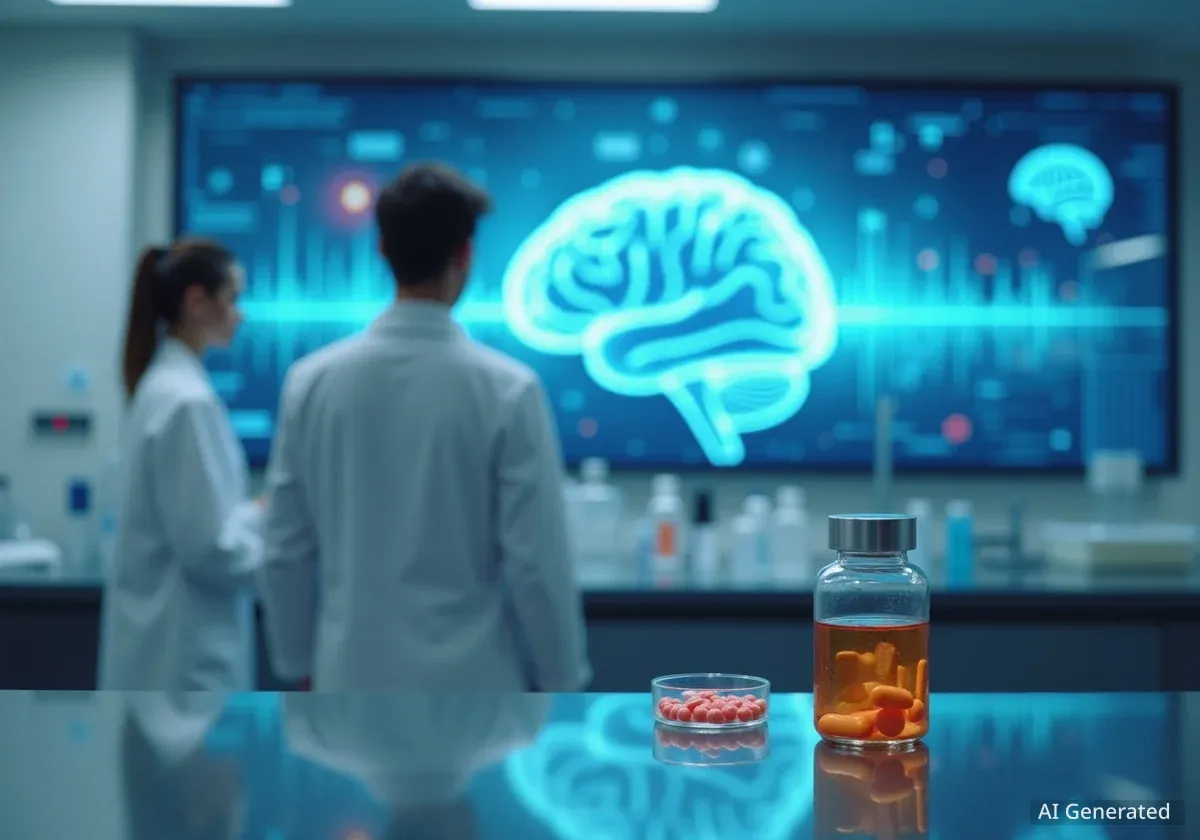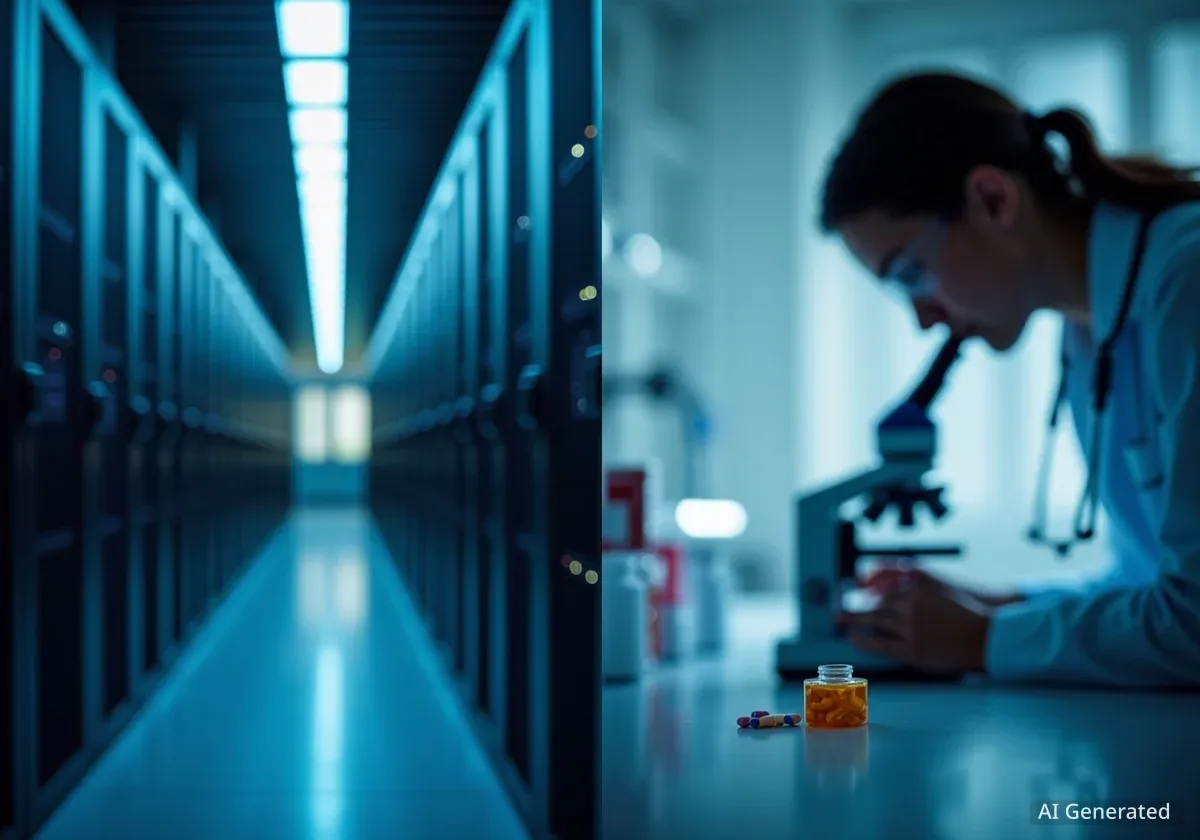Major pharmaceutical companies are showing increased interest in psychedelic therapeutics, a field once considered niche. A recent acquisition by AbbVie has sent a strong signal to the industry, suggesting that large firms are now seriously considering the commercial and scientific potential of these novel treatments for mental health disorders.
Key Takeaways
- AbbVie's recent acquisition of a depression asset from Gilgamesh Pharmaceuticals for up to $1.2 billion is seen as a major endorsement for the psychedelic sector.
- The global psychedelic drug market is projected to grow from nearly $2.8 billion in 2024 to almost $13 billion by 2035.
- Major pharmaceutical firms like Eli Lilly, Bristol Myers Squibb, and Merck are being watched as potential future entrants into the market.
- Challenges remain, including integrating psychotherapy with drug treatments and navigating a complex regulatory environment.
AbbVie's Move Validates Psychedelic Market
The pharmaceutical industry's approach to psychedelic medicine has been cautious, but recent events suggest a significant shift. Last month, AbbVie agreed to acquire Gilgamesh Pharmaceuticals' leading depression asset, a deal valued at up to $1.2 billion. This move is being interpreted by industry experts as a landmark event, potentially opening the door for more large-scale investments.
Prior to this, only a few major players had entered the space. Johnson & Johnson launched Spravato, a ketamine derivative for depression, in 2019. In 2023, Japan's Otsuka Pharmaceutical acquired Mindset Pharma, a biotech company with assets similar to psilocybin.
A Cautious Approach Changes Course
For years, most neuropsychiatry-focused pharmaceutical companies maintained a distance from psychedelics. The AbbVie-Gilgamesh deal is viewed as a pivotal moment that confirms both the scientific validity and the commercial viability of these treatments.
Aaron Bartlone, Chief Operating Officer at the psychedelic medicine company Cybin, commented on the development. "We see this AbbVie/Gilgamesh deal as a very positive sign endorsing both the science, of course, and the commercial opportunity that’s there," he told BioSpace.
Which Major Companies Could Enter Next?
With AbbVie's entry, analysts are now speculating which other pharmaceutical giants might follow. Several companies with strong neuroscience portfolios and significant capital are considered likely candidates.
Potential Industry Players
Graig Suvannavejh, Managing Director of Equity Research at Mizuho Securities, identified several firms that have been active in neuroscience acquisitions. He pointed to Bristol Myers Squibb, which recently acquired Karuna Therapeutics for $14 billion, as one to watch.
Johnson & Johnson is also seen as a candidate for further investment. "J&J already was very ahead of the game by leaning into a ketamine-based product in Spravato," Suvannavejh stated. "So it would seem to me that they also could be very interested."
Market Growth Projections
According to a market analysis by Roots Analysis, the psychedelic drug market is poised for substantial growth. Valued at nearly $2.8 billion in 2024, it is projected to reach almost $13 billion by 2035.
Eli Lilly is another company frequently mentioned. Bartlone, who began his career at Lilly, said he "wouldn’t be surprised if they somehow enter this space." Suvannavejh agreed, noting the company's historical focus on neuroscience and substantial revenue from its GLP-1 drugs.
Finally, Merck is considered a potential player. With its blockbuster drug Keytruda set to lose patent protection in 2028, the company is looking for new areas of growth. "Maybe we could see them get bigger in psychiatry," Suvannavejh added.
Navigating Treatment and Regulatory Hurdles
Despite the growing excitement, significant challenges remain for companies looking to enter the psychedelic space. These hurdles are not just regulatory but also involve fundamental differences in treatment models compared to traditional pharmaceuticals.
The Role of Psychotherapy
One of the primary barriers is the integration of psychotherapy. Many psychedelic treatments, such as MDMA-assisted therapy for PTSD, are designed to be administered alongside talk therapy sessions. This model is unfamiliar to pharmaceutical companies accustomed to developing medicine-only solutions.
"There’s a lot of trepidation, because this is going to blow up the model of interventional psychiatry as it exists today," Bartlone explained, referencing the new model of intermittent dosing combined with therapy.
Rick Doblin, founder of the Multidisciplinary Association for Psychedelic Studies (MAPS), cautioned against minimizing the therapeutic component. He argued that the recent FDA rejection of Lykos Therapeutics' MDMA therapy should not be seen as a rejection of therapy itself. "This narrative of FDA doesn’t want therapy, I don’t think that’s true," Doblin said.
Regulatory and Clinical Trial Challenges
The regulatory path is still being defined. The FDA's recent complete response letter to Lykos highlighted concerns about the durability of treatment effects and the difficulty of conducting double-blind studies with substances that have noticeable psychological effects.
Doblin advised companies to prioritize transparency to build trust with regulators and the public. He suggested making all communications with the FDA and all clinical data publicly available.
A Market Ready for New Solutions
Despite the obstacles, the demand for new mental health treatments is high. Psychiatrists and mental health providers appear ready to adopt these novel therapies once they are approved.
A survey conducted by Cybin of over 400 mental health providers found that more than 90% believe psychedelic therapies offer unique potential compared to the current standard of care. Additionally, over 95% said they were open to integrating psychedelics into their practices.
Suvannavejh noted similar feedback from psychiatrists. "They’re very excited about the potential of the psychedelics, and mainly because of the efficacy that we’re seeing and that they can be rapid acting," he said. He emphasized that for many patients with conditions like depression and schizophrenia, existing treatments often stop working, creating a significant unmet need.
Expanding Clinical Trials
The field is advancing rapidly. The number of psychedelic drug programs in Phase III clinical trials has more than doubled, growing from three to seven since June 2024. Companies like Cybin, MindMed, and Compass Pathways are leading these late-stage studies.
Cybin's own Phase II trial for its psilocin therapy, CYB003, showed a 71% remission rate in patients with major depressive disorder. The company is now preparing for a larger Phase III program. For Bartlone and others in the field, the goal is not necessarily to be first, but to provide the most effective treatment. "I think ultimately, we expect to be the winner based on data," he concluded.





